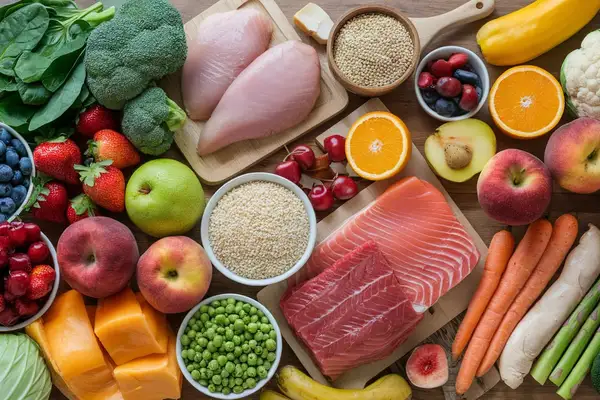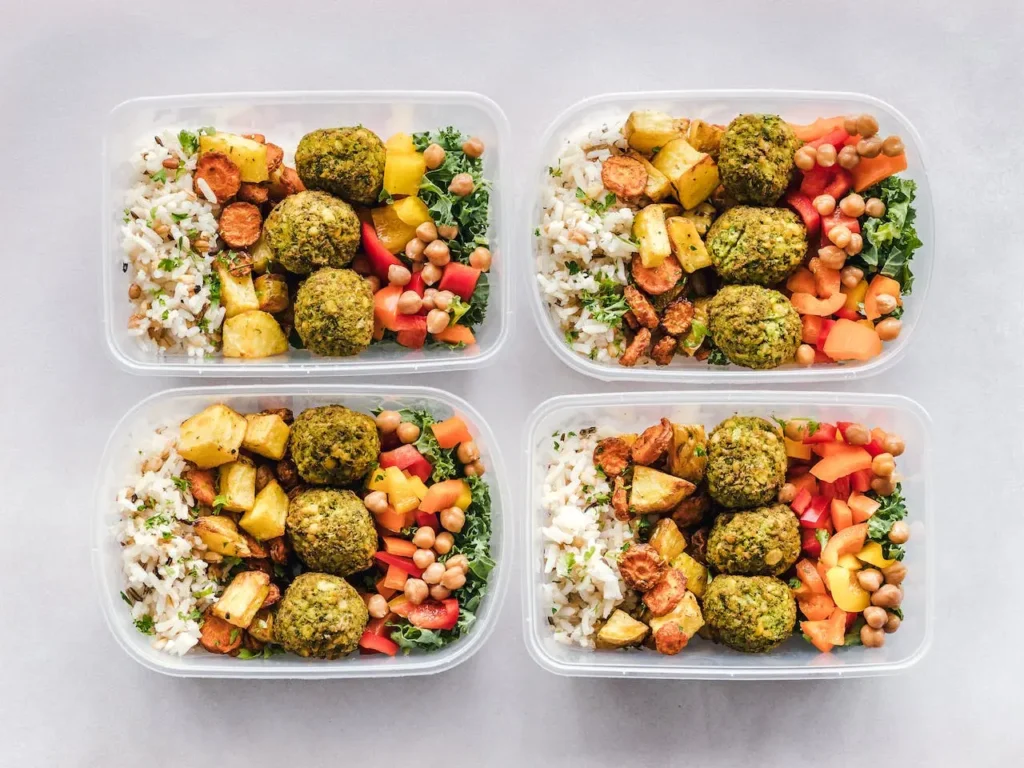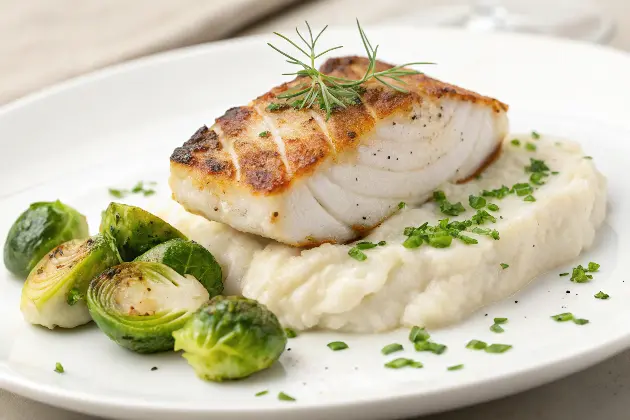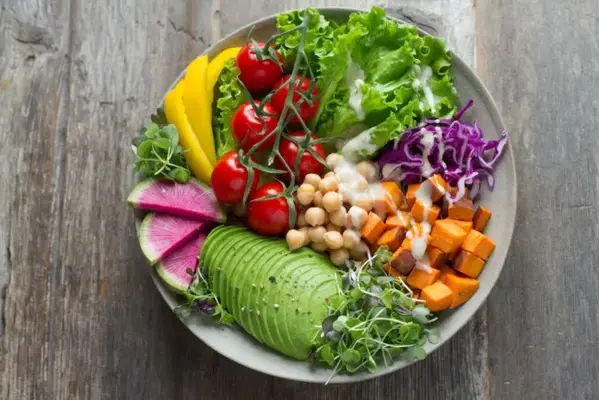7-Day Meal Plan for Elderly: Free Guide for Caregivers
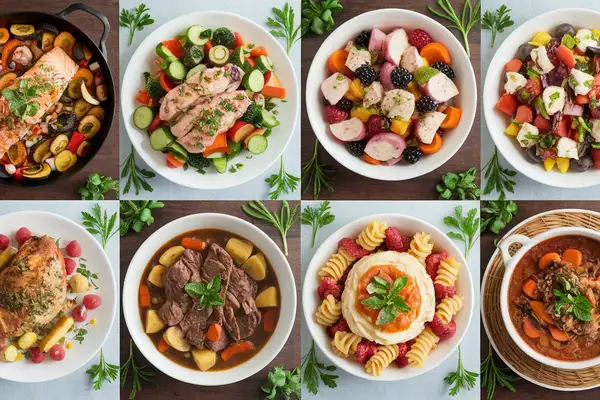
This post may contain affiliate links, meaning I may earn a commission if you make a purchase, at no extra cost to you. I only recommend products I trust. Thank you for your support.
As we age, our bodies require more attention to maintain muscle mass, bone strength, and digestive health.
Older adults have unique nutritional needs: lean protein to preserve muscle mass, calcium and vitamin D for bone strength, fiber for digestive health, and healthy fats for brain function.
This 7-day meal plan for elderly emphasizes high‑quality proteins like tender turkey, eggs, and legumes to support muscle maintenance, while keeping portions appropriate and textures soft.
This elderly diet also includes soft foods that are great sources of fiber like mashed zucchini, steamed green beans, and softened whole grains promote regularity without irritating sensitive digestive tracts.
Soft foods for elderly tend to be lower in natural water content. Soups, stews, and smoothies feature prominently in this elderly diet, helping to maintain fluid balance and prevent dehydration.
In this elderly diet plan, you’ll find both animal and plant based proteins seamlessly blended into soups, purees, and casseroles.
7-Day Meal Plan for Elderly (Elderly Diet Menu)
This 7-day meal plan for the elderly features soft, easy-to-chew foods while covering essential nutritional needs to support overall health, strength, and well-being.
This healthy diet for seniors features soft foods for elderly are rich in essential nutrients such as protein for muscle maintenance, calcium for bone health, and fiber for digestive support.

Day 1
Breakfast:
- Oatmeal with yogurt and nuts: Combine cooked oatmeal with mashed bananas and top with a sprinkle of chopped nuts or seeds, and serve alongside low-fat yogurt. (½ to 1 cup oats, 1 banana, 1 cup low-fat yogurt, nuts or seeds)
Lunch:
- Turkey and Butternut Squash Bone Broth Soup: A comforting, protein-rich soup made with tender turkey, creamy butternut squash, and nutrient-dense bone broth to support muscle strength, joint health, and overall wellness. (1 to 1½ cups)
Dinner:
- Baked salmon with sweet potatoes and spinach: A wholesome dinner featuring protein-packed baked salmon, mashed sweet potatoes for energy, and steamed spinach for vitamins. (3-4 oz. salmon, ½ to 1 cup sweet potatoes, ½ to 1 cup spinach)
Snacks:
- Greek yogurt with honey and berries: A light and refreshing snack offering probiotics and antioxidants. (1 cup yogurt, 1 tbsp honey, berries)
- Mashed Berries with Ricotta: A soft and creamy blend of ricotta cheese with mashed mixed berries. (½ cup ricotta, ½ cup mixed berries)

Day 2
Breakfast:
- Scrambled eggs with vegetables and toast: Soft scrambled eggs with finely chopped cooked vegetables served with whole grain toast for a simple, nutritious start to the day. (1 egg, vegetables, 1 slice toast)
Lunch:
- Roasted Cauliflower and Algae Soup: Roasted cauliflower blended with nutrient-rich algae in a smooth, savory broth for a fiber-filled, immune-supporting soup. (1 to 1½ cups soup)
Dinner:
- Berry chicken salad: Grilled chicken breast mixed with fresh berries, leafy greens, and a light vinaigrette for a refreshing, protein-packed salad. (3-4 oz. chicken breast, berries, leafy greens, vinaigrette)
Snacks:
- Apple slices with peanut butter: A healthy snack offering a blend of natural sugars and healthy fats. (1 apple, 2 tbsp peanut butter)
- Pumpkin Seed Pudding with Cinnamon: A soft and nutrient-dense snack made from pumpkin seeds blended into a pudding-like consistency, flavored with cinnamon. (¼ cup pumpkin seeds, ½ cup almond milk, ½ tsp cinnamon)
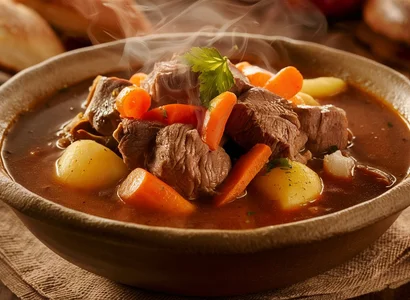
Day 3
Breakfast:
- Greek yogurt with berries and toast: Greek yogurt blended with mixed berries and served with soft whole grain toast for a filling, antioxidant-rich breakfast. (1 cup yogurt, berries, 1 slice toast)
Lunch:
- Garlicky roasted eggplant with creamy yogurt sauce: Roasted eggplant slices seasoned with garlic and topped with a creamy yogurt sauce, served with a side of whole grain bread for a satisfying, plant-based dinner. (1 whole eggplant, garlic, 1 cup yogurt, whole grain bread)
Dinner:
- Soft cooked beef stew with carrots and potatoes: A comforting beef stew cooked with soft carrots and potatoes, providing a satisfying balance of protein and carbohydrates. (1 to 1½ cups beef stew, ½ to 1 cup potatoes, ½ to 1 cup carrots)
Snacks:
- Avocado on Whole Grain Crackers: A heart-healthy snack of mashed avocado spread on whole grain crackers, seasoned with a pinch of salt and pepper. (½ avocado, 4-5 whole grain crackers)
- Soft Cottage Cheese with Berries: A soft and creamy snack that pairs cottage cheese with the natural sweetness of mixed berries, rich in antioxidants. (1 cup cottage cheese, ½ cup mixed berries)
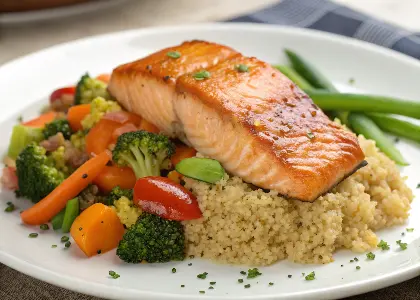
Day 4
Breakfast:
- Cottage cheese with peaches and pancakes: Creamy cottage cheese served with diced peaches, accompanied by a whole grain pancake for a light but satisfying breakfast. (½ to 1 cup cottage cheese, 1 peach, pancake)
Lunch:
- Vegetable stir-fry: Stir-fried vegetables such as broccoli, bell peppers, and carrots, served with a side of steamed brown rice for a filling and fiber-rich meal. (1 to 1½ cups stir-fry, ½ to 1 cup brown rice)
Dinner:
- One-pan salmon and vegetables: Baked salmon fillet with roasted vegetables such as zucchini, bell peppers, and carrots, all cooked together in one pan for a flavorful and easy meal. (3-4 oz. salmon, mixed vegetables)
Snacks:
- Banana with almond butter and yogurt-covered pretzels: A filling snack with a mix of healthy fats and a touch of sweetness. (1 banana, 1 tbsp almond butter, yogurt-covered pretzels)
- Hummus with cucumber slices: A light and healthy snack pairing creamy hummus with fresh cucumber slices. (¼ cup hummus, cucumber slices)

Day 5
Breakfast:
- Smoothie with spinach, banana, and oatmeal cookies: A smoothie made with spinach, banana, and almond milk, paired with soft oatmeal cookies for a nutrient-packed breakfast. (1 cup smoothie, 2 cookies)
Lunch:
- Barley and vegetable stew with green beans: A wholesome barley and vegetable stew, served with steamed green beans for extra fiber and nutrients. (1 to 1½ cups stew, ½ to 1 cup green beans)
Dinner:
- Baked chicken with mashed cauliflower and zucchini: Baked chicken breast served with mashed cauliflower and steamed zucchini for a low-carb, nutrient-dense meal. (3-4 oz. chicken, ½ to 1 cup cauliflower, ½ to 1 cup zucchini)
Snacks:
- Cottage cheese with sliced peaches: A light snack offering protein and natural sweetness. (1 cup cottage cheese, 1 peach)
- Apple slices with peanut butter: A satisfying and healthy snack with the natural sweetness of apple slices paired with creamy peanut butter. (1 apple, 2 tbsp peanut butter)
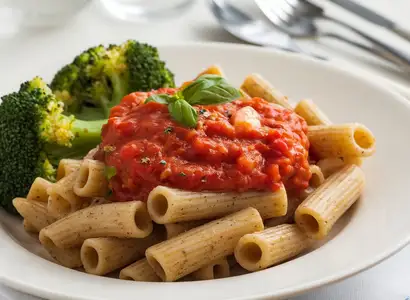
Day 6
Breakfast:
- Scrambled tofu with toast: Scrambled tofu with finely chopped cooked vegetables served with whole grain toast for a vegan-friendly breakfast rich in protein. (½ to 1 cup tofu, vegetables, 1 slice toast)
Lunch:
- Creamy potato leek soup with carrots and bread: A creamy, comforting potato and leek soup paired with steamed carrots and a soft whole grain bread roll. (1 to 1½ cups soup, ½ to 1 cup carrots, bread roll)
- Roasted root vegetables: A combination of roasted carrots, sweet potatoes, and parsnips seasoned with olive oil and herbs, paired with a side of quinoa for a wholesome and nutritious meal. (1 to 1½ cups vegetables, ½ to 1 cup quinoa)
Dinner:
- Soft-cooked pasta with marinara sauce: Whole grain pasta served with a simple marinara sauce and a side of steamed broccoli for a balanced meal. (1 to 1½ cups pasta, marinara sauce, ½ to 1 cup broccoli)
Snacks:
- Mixed fruit kabobs: A refreshing and light snack with a variety of fresh fruits. (assorted fruit)
- Greek yogurt with honey and almonds: Creamy Greek yogurt topped with honey and a handful of almonds for a light and satisfying snack. (1 cup yogurt, 1 tbsp honey, almonds)
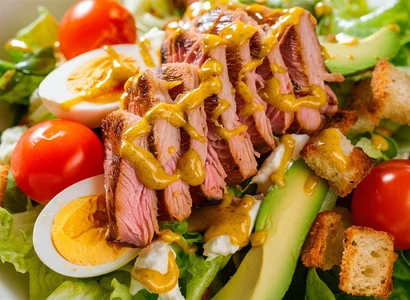
Day 7
Breakfast:
- Mashed avocado on toast with poached egg: A nutrient-rich breakfast featuring mashed avocado on soft whole grain toast, topped with a poached egg for added protein. (½ avocado, 1 slice toast, 1 poached egg)
Lunch:
- Berry chicken salad: Grilled chicken breast mixed with fresh berries and leafy greens, drizzled with a light balsamic vinaigrette for a refreshing and protein-rich meal. (3-4 oz. chicken, berries, greens, vinaigrette)
Dinner:
- Tuna Niçoise salad: A classic salad with seared tuna, boiled eggs, steamed green beans, baby potatoes, tomatoes, and olives, drizzled with a light vinaigrette. (3-4 oz. tuna, 1 egg, ½ to 1 cup green beans, ½ to 1 cup potatoes, tomatoes, olives, vinaigrette)
Snacks:
- Fresh fruit salad: A light and refreshing mix of seasonal fruits. (assorted fruit)
- Cottage cheese with pineapple: A light and refreshing snack that combines creamy cottage cheese with the natural sweetness of pineapple. (1 cup cottage cheese, pineapple chunks)
Best Food For Elderly Diet
These foods are not only nutrient-rich but also easy to prepare and gentle on the digestive system, making them ideal for the elderly diet.
Here is a list of foods that seniors should eat that you should consider incorporating into the 7-day meal plan for elderly:
1. Protein-Rich Foods
- Lean Meats: Chicken, turkey, lean cuts of beef
- Fish: Salmon, tuna, mackerel (rich in omega-3 fatty acids)
- Eggs: Whole eggs, especially soft-boiled or scrambled
- Legumes: Lentils, chickpeas, black beans
- Tofu and Tempeh: Plant-based protein options for vegetarians
- Dairy: Greek yogurt, cottage cheese, low-fat milk
2. Whole Grains
- Oats: Old-fashioned oats, steel-cut oats
- Whole Grain Bread: Soft whole grain bread and rolls
- Brown Rice: Soft-cooked for easy digestion
- Quinoa: A high-protein grain that’s easy to digest
- Barley: Great for soups or stews
- Whole Grain Pasta: Opt for softer cooked options
3. Fruits
- Berries: Blueberries, strawberries, raspberries (rich in antioxidants)
- Citrus Fruits: Oranges, grapefruits, mandarins (high in vitamin C)
- Bananas: Easy to eat, high in potassium
- Apples: Peeled and sliced for easier chewing
- Pears: Soft or steamed for easier consumption
- Avocado: Rich in healthy fats, soft and creamy
4. Vegetables
- Leafy Greens: Spinach, kale, Swiss chard (rich in vitamins A, C, and K)
- Cruciferous Vegetables: Broccoli, Brussels sprouts, cauliflower (steamed for easier digestion)
- Carrots: Steamed or pureed
- Sweet Potatoes: Rich in fiber and beta-carotene, mashed or baked
- Zucchini: Lightly cooked for easier chewing
- Beets: Steamed or roasted for softness
5. Healthy Fats
- Olive Oil: Use for cooking or in dressings
- Nuts and Seeds: Almonds, walnuts, chia seeds (ground for easier consumption)
- Nut Butters: Peanut butter, almond butter (smooth for easier swallowing)
- Fatty Fish: Salmon, sardines (rich in omega-3 fatty acids)
- Avocado: Creamy and nutrient-dense
6. Dairy Alternatives
- Almond Milk: Fortified with calcium and vitamin D
- Soy Milk: Rich in protein, good for those avoiding dairy
- Lactose-Free Milk: A good alternative for those with lactose intolerance
7. Hydrating Foods
- Cucumbers: High in water content, easily digestible
- Watermelon: Refreshing and hydrating
- Celery: Light and water-rich, easy on digestion
- Soups and Broths: Chicken or vegetable broth-based soups
8. Fiber-Rich Foods
- Oats: Helps regulate digestion
- Chia Seeds: High in fiber, can be added to yogurt or smoothies
- Flaxseeds: Ground and added to oatmeal or yogurt
- Beans and Legumes: Black beans, lentils, and chickpeas (high in fiber, great for digestive health)
- Bran Cereals: High in fiber, suitable for digestive health
9. Bone-Strengthening Foods
- Dairy: Milk, yogurt, and cheese (high in calcium and vitamin D)
- Leafy Greens: Kale, collard greens, and spinach (rich in calcium)
- Fortified Foods: Fortified cereals and plant-based milks (fortified with calcium and vitamin D)
10. Antioxidant-Rich Foods
- Berries: Blueberries, blackberries, and raspberries (high in antioxidants)
- Nuts: Almonds, walnuts (good for brain health)
- Dark Chocolate: Rich in flavonoids, good for heart health
- Green Tea: Contains antioxidants that support overall health
11. Heart-Healthy Foods
- Fatty Fish: Salmon, sardines, and mackerel (rich in omega-3s)
- Whole Grains: Oats, brown rice, and quinoa (fiber-rich for heart health)
- Nuts and Seeds: Walnuts, chia seeds (good for lowering cholesterol)
- Legumes: Beans, lentils, and peas (rich in fiber and protein)
- Olive Oil: Use for cooking and in salad dressings (rich in monounsaturated fats)
Worst Foods For Elderly Diet
Avoiding or limiting these foods can help seniors maintain better health and manage conditions related to aging, such as high blood pressure, diabetes, and digestive issues.
Here’s a list of foods that are generally considered less suitable for an elderly diet plan:
1. Processed Foods
- Packaged Snacks: Chips, pretzels, and sugary snacks (often high in unhealthy fats, sodium, and sugar)
- Processed Meats: Hot dogs, sausages, and deli meats (high in sodium and preservatives)
- Instant Noodles and Soups: Often high in sodium and artificial additives
2. Sugary Foods and Beverages
- Sugary Drinks: Sodas, fruit juices with added sugar (high in empty calories and can lead to weight gain and diabetes)
- Candy and Sweets: Candy bars, cakes, and pastries (high in sugar and unhealthy fats, which can affect blood sugar levels and dental health)
- Sugary Cereals: Many breakfast cereals with added sugars (can cause blood sugar spikes)
3. High-Sodium Foods
- Salty Snacks: Potato chips, salted nuts, and crackers (can contribute to high blood pressure and fluid retention)
- Canned Foods: Some canned vegetables and soups (can be high in sodium unless labeled as low-sodium)
- Fast Food: Often high in sodium and unhealthy fats
4. High-Fat Foods
- Fried Foods: Fried chicken, French fries, and doughnuts (high in trans fats and calories, which can contribute to heart disease)
- Fatty Cuts of Meat: Ribeye steaks, pork belly (high in saturated fats)
- Butter and Lard: High in saturated fats and cholesterol
5. Refined Carbohydrates
- White Bread: Lacks fiber and nutrients compared to whole grain options
- Pastries and Donuts: Often made with refined flour and high in sugar and fat
- White Rice: Less nutritious than brown rice and other whole grains
6. Highly Processed and Artificial Foods
- Artificial Sweeteners: Some research suggests potential negative health effects with long-term use
- Food with Artificial Additives: Foods with artificial colors, flavors, and preservatives (may affect overall health and well-being)
- Microwave Meals: Often high in sodium, unhealthy fats, and preservatives
7. High-Cholesterol Foods
- Egg Yolks: High in cholesterol (should be consumed in moderation if there are concerns about cholesterol levels)
- Cream and Full-Fat Dairy Products: Whole milk, heavy cream (high in saturated fats and cholesterol)
8. Foods that Are Difficult to Digest
- Tough Meats: Some cuts of beef or pork that are not cooked tenderly (can be hard to chew and digest)
- Raw Vegetables: Hard, raw vegetables like carrots or celery (may be difficult for those with dental issues; cooked or shredded options are better)
- Foods High in Fiber: Beans and legumes (may cause digestive discomfort if not well-tolerated)
9. Alcoholic Beverages
- Excessive Alcohol: Can interfere with medications, affect balance, and contribute to health issues like liver disease and high blood pressure
10. Foods with High Glycemic Index
- White Bread: Rapidly increases blood sugar levels
- Instant Oatmeal: Often contains added sugars and has a high glycemic index
- Potato Chips: Quickly raises blood sugar levels
Elderly Diet Meal Prep Tips
Here are some practical meal prep tips for elderly individuals to ensure a nutritious, balanced elderly diet while making cooking and eating easier for seniors:
- Brain boosting foods: Include foods rich in omega-3 fatty acids, antioxidants, and B vitamins in the elderly diet plan to support cognitive function, such as fatty fish, berries, nuts, and whole grains.
- Smaller, more frequent meals: Some seniors may feel fuller faster or have a reduced appetite. Eating smaller meals throughout the day, rather than three large meals, can help ensure they are getting enough nutrients.
- Focus on soft and easy-to-chew foods: Steamed vegetables, mashed potatoes, and slow-cooked meats can be gentler on teeth and gums. For those with chewing difficulties, consider pureeing soups or mashing foods to make them easier to eat.
- Mood stabilizing foods: Certain nutrients, such as magnesium, zinc, and vitamin D, can support mood regulation. Incorporate foods like dark chocolate, legumes, seeds, and fatty fish into the diet.
- Incorporate high fiber foods: Fiber aids digestion and helps prevent constipation, a common issue for the elderly. Include whole grains, legumes, fruits, and vegetables in the seniors diet.
- Limit salt and sugar: Excess salt can lead to high blood pressure, while too much sugar increases the risk of diabetes and weight gain. Season foods with herbs and spices instead of salt, and choose natural sources of sweetness, like fruit, instead of sugary snacks.
- Balanced meals: Ensure that meals contain a combination of macronutrients, including carbohydrates, proteins, and fats. This helps maintain stable blood sugar levels and prevents energy crashes.
- Mind portion sizes: Keep portion sizes appropriate, as seniors may have lower energy needs, especially if they are less physically active. Balance portion sizes to avoid overeating while ensuring meals are still nutrient-dense.
- Regular mealtimes: Establish a routine for meals to provide structure and stability. Consistent mealtimes can contribute to a sense of security and well-being.
- Incorporate favorite foods: Include the senior’s favorite foods in moderation. This adds enjoyment to their meals and can uplift their spirits.
Elderly Diet Tips for Specific Health Conditions
Seniors often have specific health conditions that require dietary modifications. It is crucial to understand these conditions and adapt 7 day meal plan for elderly accordingly.
- Diabetes: A healthy diet for seniors should limit the intake of sugary foods and carbohydrates. Focus on whole grains, lean proteins, and non-starchy vegetables.
- Heart Disease: Reduce saturated and trans fats. Prioritize fruits, vegetables, whole grains, and lean proteins in the elderly diet meal prep.
- High Blood Pressure: An elderly diet should limit sodium intake. Use herbs, spices, and other flavor enhancers instead of salt. Choose low sodium foods when available.
- Osteoporosis: Include foods rich in calcium and vitamin D, such as dairy products, leafy greens, and fortified cereals in a healthy diet for seniors.
- Digestive Issues: If the senior experiences digestive issues such as constipation or acid reflux, incorporate fiber-rich foods, probiotics, and smaller, more frequent meals.
Resources
Seeking professional guidance from nutritionists and dietitians can provide valuable insights and personalized meal plans for seniors.
Here are some of the renowned nutritionists in United States:
- Christine Rosenbloom, PhD, RDN, FAND:
- Services: Geriatric nutrition, sports nutrition for older adults.
- Website: www.chrisrosenbloom.com
- Dr. David Katz:
- Services: Preventive medicine, lifestyle medicine, with particular expertise in nutrition.
- Website: www.davidkatzmd.com
Conclusion
A well thought out 7-day meal plan for elderly can provide a diverse range of nutrient-dense foods, ensuring that seniors receive the necessary vitamins, minerals, and macronutrients vital for their health.
By incorporating a variety of lean proteins, whole grains, fruits, vegetables, and healthy fats in the elderly diet plan, caregivers and individuals can help maintain balanced and nutritious diets for seniors.
Additionally, when creating a healthy diet for seniors, it’s crucial to consider individual dietary restrictions, health conditions, and any challenges related to appetite or food preparation.
Collaborating with nutritionists empowers caregivers to adhere to nutrition guidelines, enabling them to craft personalized 7-day meal plan for elderly tailored to ensure seniors receive the specific nourishment they need to thrive.
It’s crucial to adopt a holistic approach that includes a well-planned 7-day meal plan for elderly as part of the caregiving routine.
- Life expectancy with fatty liver
- Crohn’s Disease Diet Plan: What to Eat and What to Avoid
- 21-day fatty liver diet plan
- 7-Day Meal Plan for Pancreatitis Recovery
- Diabetic meal plan
- Healthy renal diet
- Comfort care or palliative care
- Alzheimer’s and dementia
- Best senior living homes
- How to initiate end of life conversations with seniors
- Caring for stroke patients
- 1600 calorie meal plan
- 1400-calorie meal plan
- Clean eating diet plan
- 14 days of eating real food
Frequently Asked Questions (FAQs)
What should be the focus of a 7-day meal plan for elderly?
The focus of a 7 day meal plan for elderly should be on providing nutrient dense foods that are rich in vitamins, minerals, and protein, while being mindful of individual dietary restrictions and health conditions.
Are bananas good for elderly diet?
Yes, bananas are beneficial for the elderly diet. They are easy to digest, rich in potassium, and provide a quick source of energy. Bananas also help regulate blood pressure and support heart health.
What vitamin gives seniors energy?
Vitamin B12 plays a crucial role in boosting energy levels for seniors. It supports red blood cell production and neurological function, which are essential for energy metabolism. Other B vitamins, like B6 and folate, also help with energy production.
Is oatmeal good for the elderly?
Yes, oatmeal is a great option for the elderly diet. It is high in fiber, helps maintain steady blood sugar levels, and supports heart health. Oatmeal also provides a slow-releasing source of energy, making it a nourishing breakfast choice.
What foods give energy to the elderly?
Foods rich in protein, fiber, healthy fats, and complex carbohydrates provide sustained energy for the elderly. Examples include whole grains, lean meats like chicken and fish, eggs, beans, and nutrient-dense fruits and vegetables like leafy greens, sweet potatoes, and berries
